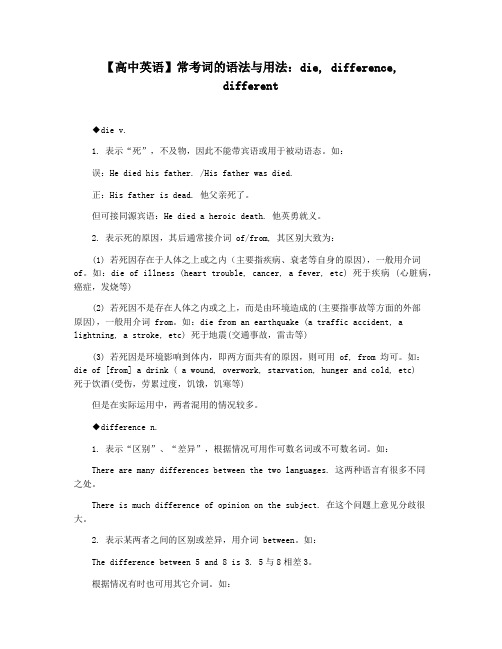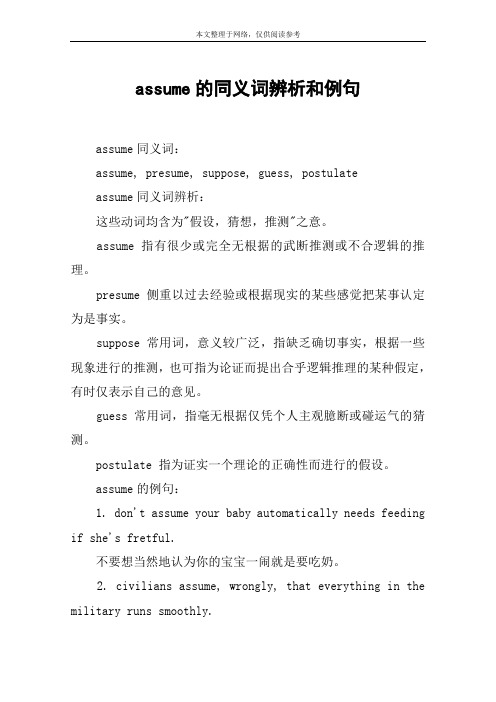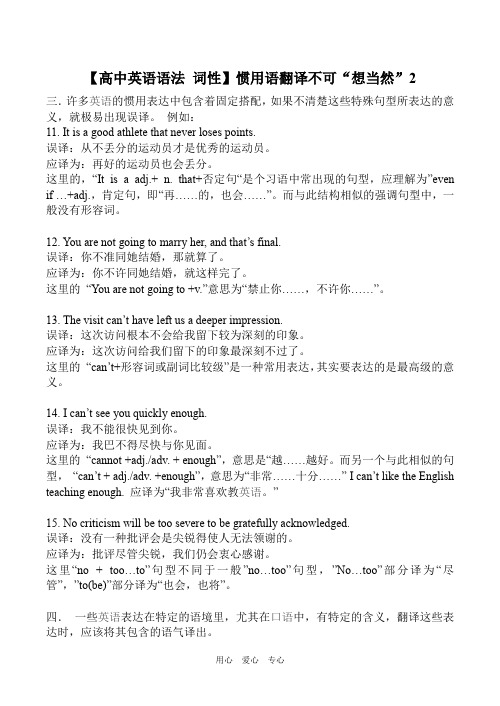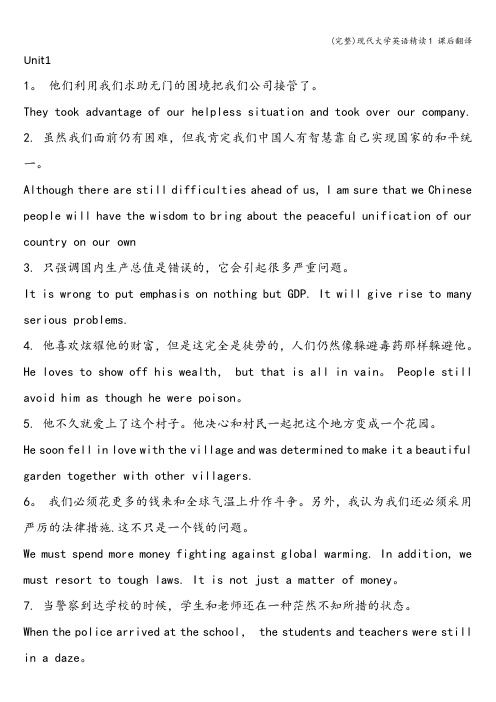不能想当然的英语
- 格式:wps
- 大小:20.00 KB
- 文档页数:4


【高中英语】常考词的语法与用法:die, difference,different◆die v.1. 表示“死”,不及物,因此不能带宾语或用于被动语态。
如:误:He died his father. /His father was died.正:His father is dead. 他父亲死了。
但可接同源宾语:He died a heroic death. 他英勇就义。
2. 表示死的原因,其后通常接介词 of/from, 其区别大致为:(1) 若死因存在于人体之上或之内(主要指疾病、衰老等自身的原因),一般用介词of。
如:die of illness (heart trouble, cancer, a fever, etc) 死于疾病 (心脏病,癌症,发烧等)(2) 若死因不是存在人体之内或之上,而是由环境造成的(主要指事故等方面的外部原因),一般用介词 from。
如:die from an earthquake (a traffic accident, a lightning, a stroke, etc) 死于地震(交通事故,雷击等)(3) 若死因是环境影响到体内,即两方面共有的原因,则可用 of, from 均可。
如:die of [from] a drink ( a wound, overwork, starvation, hunger and cold, etc)死于饮酒(受伤,劳累过度,饥饿,饥寒等)但是在实际运用中,两者混用的情况较多。
◆difference n.1. 表示“区别”、“差异”,根据情况可用作可数名词或不可数名词。
如:There are many differences between the two languages. 这两种语言有很多不同之处。
There is much difference of opinion on the subject. 在这个问题上意见分歧很大。

assume的同义词辨析和例句assume同义词:assume, presume, suppose, guess, postulateassume同义词辨析:这些动词均含为"假设,猜想,推测"之意。
assume 指有很少或完全无根据的武断推测或不合逻辑的推理。
presume 侧重以过去经验或根据现实的某些感觉把某事认定为是事实。
suppose 常用词,意义较广泛,指缺乏确切事实,根据一些现象进行的推测,也可指为论证而提出合乎逻辑推理的某种假定,有时仅表示自己的意见。
guess 常用词,指毫无根据仅凭个人主观臆断或碰运气的猜测。
postulate 指为证实一个理论的正确性而进行的假设。
assume的例句:1. don't assume your baby automatically needs feeding if she's fretful.不要想当然地认为你的宝宝一闹就是要吃奶。
2. civilians assume, wrongly, that everything in the military runs smoothly.老百姓以为军队中一切都运转正常,其实不然.3. people assume they know me through and through the moment we meet.人们一见到我,就自以为对我了如指掌了。
4. "today?" — "i'd assume so, yeah."“今天?”——“对,我觉得是。
”5. you cannot assume that a speaker of english is ipso facto qualified to teach english.你不能假定会说英语的人就有资格教英语。
6. it is reasonable to assume that he knew beforehand that this would happen.有理由认为他事先就知道会发生这样的事。

【高中英语语法词性】惯用语翻译不可“想当然”2三.许多英语的惯用表达中包含着固定搭配,如果不清楚这些特殊句型所表达的意义,就极易出现误译。
例如:11. It is a good athlete that never loses points.误译:从不丢分的运动员才是优秀的运动员。
应译为:再好的运动员也会丢分。
这里的,“It is a adj.+ n. that+否定句“是个习语中常出现的句型,应理解为”even if …+adj.,肯定句,即“再……的,也会……”。
而与此结构相似的强调句型中,一般没有形容词。
12. You are not going to marry her, and that’s final.误译:你不准同她结婚,那就算了。
应译为:你不许同她结婚,就这样完了。
这里的“You are not going to +v.”意思为“禁止你……,不许你……”。
13. The visit can’t have left us a deeper impression.误译:这次访问根本不会给我留下较为深刻的印象。
应译为:这次访问给我们留下的印象最深刻不过了。
这里的“can’t+形容词或副词比较级”是一种常用表达,其实要表达的是最高级的意义。
14. I can’t see you quickly enough.误译:我不能很快见到你。
应译为:我巴不得尽快与你见面。
这里的“cannot +adj./adv. + enough”,意思是“越……越好。
而另一个与此相似的句型,“can’t + adj./adv. +enough”,意思为“非常……十分……” I can’t like the English teaching enough. 应译为“我非常喜欢教英语。
”15. No criticism will be too severe to be gratefully acknowledged.误译:没有一种批评会是尖锐得使人无法领谢的。

not … until… / Not until… / It was not until… that1.直到会议快要结束时他才露面。
(show up)2.直到二十世纪初人们才学会怎样防止这种疾病的蔓延。
(prevent)3.直到那时他才意识到他的老师是非常善解人意的。
(considerate)4.可惜他们直到事故发生之后才采取措施防止它。
]5.直到上周末收到你的来信时我们才如释负重。
(relieve)The more… the more..1.你的词汇量越大,你就感到用英语写作越容易。
(feel it + adj. to do )2.)3.人们普遍认为,用脑越多,思维就越活跃。
( it is generally believed that )4.问题发现得越早,解决起来越容易。
5.问题越难,我越有可能能够解决他们。
(likely)6.我们学习得越多,将来就越能为我们国家工作的越好。
7.》8.你练习讲英语越多,就越对你有好处。
(do sb good)9.我们经常讨论的一个问题是:是否钱越多越幸福。
10.相对而言,孩子与父母交流越多,越不可能感到忧郁。
(suffer from)No matter how / however + adj. / adv. + S + V1.不管这个新体系有多复杂,我们还是要用它。
(complicated)%2.无论社会发展得多快,这个传统应该代代相传。
(pass on)3.无论他如何努力,他似乎永远学不好物理。
4.不管我们有多忙,下星期我们一定会举行一次欢送会向那些退休工人们表示敬意。
(in honor of)>5.不管天有多晚,他从不把今天必须做的事拖到明天。
(put off)6.如果我们以一种强烈的意志工作,我们能够克服任何的困难,无论这个困难有多大。
Adj. / adv. / n. / v. + as / though + S + V1.虽然他很聪明,但他不愿把全部时间用在学习上。

Unit11。
他们利用我们求助无门的困境把我们公司接管了。
They took advantage of our helpless situation and took over our company.2. 虽然我们面前仍有困难,但我肯定我们中国人有智慧靠自己实现国家的和平统一。
Although there are still difficulties ahead of us, I am sure that we Chinese people will have the wisdom to bring about the peaceful unification of our country on our own3. 只强调国内生产总值是错误的,它会引起很多严重问题。
It is wrong to put emphasis on nothing but GDP. It will give rise to many serious problems.4. 他喜欢炫耀他的财富,但是这完全是徒劳的,人们仍然像躲避毒药那样躲避他。
He loves to show off his wealth, but that is all in vain。
People still avoid him as though he were poison。
5. 他不久就爱上了这个村子。
他决心和村民一起把这个地方变成一个花园。
He soon fell in love with the village and was determined to make it a beautiful garden together with other villagers.6。
我们必须花更多的钱来和全球气温上升作斗争。
另外,我认为我们还必须采用严厉的法律措施.这不只是一个钱的问题。
We must spend more money fighting against global warming. In addition, we must resort to tough laws. It is not just a matter of money。
李阳疯狂英语100句1.How are you doing? (你好吗?)2.I'm doing great. (我过得很好。
)3.What's up? (出什么事了/你在忙些什么/怎么了?)4.Nothing special. (没什么特别的。
)5.Hi. Long time no see. (嗨,好久不见了。
)6.So far so good. (到目前为止,一切都好。
)7.Things couldn't be better. (一切顺利。
)8.How about yourself? (你自己呢?)9.Today is a great day. (今天是个好日子。
)10.Are you making progress? (有进展吗?)11.May I have your name, please? (请问尊姓大名?)12.I've heard so much about you. (久仰大名。
)13.I hope you're enjoying your staying here. (希望你在这里过得愉快。
)14.Let's get together again. (改天再聚聚。
)15.That's a great idea! (好主意!)16.Please say hello to your mother for me. (请代我向你母亲问好。
)17.I'm glad to have met you. (很高兴遇到你。
)18.Don't forget us. (别忘了我们。
)19.Keep in touch. (保持联系。
)20.I had a wonderful time here. (我在这里度过了难忘的时光。
)21.Have a nice weekend. (周末愉快。
)22.Same to you. (彼此彼此。
李阳疯狂英语英文365句001.Absolutely (用于答话)是这样;当然是;正是如此;绝对如此。
002.Absolutely impossible.! 绝对不可能的!003.All I have to do is learn English. 我所要做的就是学英语。
004.Are you free tomorrow? 你明天有空吗005.Are you married? 你结婚了吗?006.Are you used to the food here? 你喜欢吃这儿得饭菜吗?007.Be careful. 小心/注意。
008.Be my guest. 请便/别客气。
009.Better late than never. 迟到总比不到好。
010.Better luck next time. 祝你下一次好运。
011.Better safe than sorry. 小心不出大错。
012.Can I have a day off? 我能请一天假吗?013.Can I help you? 要我帮忙吗?014.Can I take a message? 要我传话吗?015.Can I take a rain check? 你能改天再请我吗?016.Can I take your order? 你要点菜吗?017.Can you give me a wake-up call? 你能打电话叫醒我吗?018.Can you give me some feedback? 你能给我一些建议吗?019.Can you make it? 你能来吗?020.Can I have a word with you? 我能跟你谈一谈吗?021.Catch me later. 过会儿再来找我。
022.Cheer up! 高兴起来!振作起来!023.Come in and make yourself at home. 请进,别客气。
英语重点词汇语法hand in glove 详解hand in glove千万不要想当然地译为:手套里的手。
hand in glove的意思是“working together, often to do something dishonest”,即“同某人密切合作(尤指勾结做一些不好的事情);相互勾结;狼狈为奸”。
这个短语源于乔纳森·斯威夫特的《Polite Conversation》。
当你想表示某人同另一人密切合作,其后常接with sb.。
例句如下:He has been hand in glove with the mayor for years.多年来,他一直与那位市长密切合作。
They hope to be hand in glove with the investors to solve the problem.他们希望与投资者密切合作以解决这个问题。
If we can work hand in glove, we can achieve a win-win result.如果我们可以密切合作,我们就可以实现双赢。
The judge was working hand in glove with this defendant, I did not see it coming.我没有想到,法官和被告狼狈为奸。
German universities work hand in glove with researchers at local firms.德国的大学与研究者一起在当地公司里亲密合作。
It's said that the man was working hand in glove with the local police.据说这名男子当时正与当地警察密切合作。
The UN inspectors work hand in glove with the Western intelligence agencies.联合国观察员和西方情报机构之间密切合作。
Sporting house 妓院(不是体育室)
Dead president 美钞(不是死了的总统)
Lover 情人(不是爱人)
Busboy 餐馆勤杂工(不是公汽售票员)
Busybody 爱管闲事的人(不是大忙人)
Dry goods <美>纺织品 <英>谷物(不是干货)
Heart man 换心人(不是有心人)
Mad doctor精神病科医生(不是发疯的医生)
Eleventh hour最后时刻(不是十一点)
Blind date(由第三者安排的)男女初次见面(并非盲目的约会或者是瞎约会)
Personal remark人身攻击(并非个人评论)
Sweet water淡水(不是糖水或者甜水)
Confidence man骗子(不是信得过的人)
Criminal lawyer 刑事律师(不是犯罪的律师)
Service station加油站(不是服务站)
Rest room厕所(不是休息室)
Dressing room化妆室(不是试衣间或者更衣室)
Horse sense常识(不是马的感觉)
Capital idea 好主意(不是资本主义思想)
Familiar talk 庸俗的交谈(不是熟悉的谈话)
Black tea红茶
Black art 妖术(不是黑色艺术)
Black stranger 完全陌生的人(不是陌生的黑人)
White coal (作动力来源用的)水
White man忠实可靠的人(不是皮肤白色的人)
Yellow book黄皮书(法国政府报告书,以黄纸为封,不是黄色书籍)
Red tape 官僚习气(不是红色带子)
Green hand 新手
Blue stocking 女学者,女才子(不是蓝色长筒袜)China policy 对华政策(不是中华政策)
Chinese dragon 麒麟(不是中国龙)
American beauty 一种玫瑰,名叫美丽动人(不是美国美女)
English disease 软骨病(不是英国病)
Indian summer 愉快宁静的晚年(不是印度的夏日)Greek gift 害人的礼品(不是希腊的礼物)
Spanish athlete 吹牛的人(不是西班牙的运动员)French chalk 滑石粉(不是法国粉笔)
Pull ones leg 开玩笑(不是拉后腿)
In ones birthday suit 赤身裸体(不是穿着生日礼服)Eat ones words 收回前言(不是食言)
An apple of love 西红柿(不是爱情之果)
Handwriting on the wall 不祥之兆(不是大字报)Bring down the house 博得满堂喝彩(不是推倒房子)Have a fit 勃然大怒(不是试穿)
Make ones hair stand on end 令人毛骨悚然,恐惧(不是令人发指,气愤)
Be taken in 受骗,上当(不是被接纳)
Think a great deal of oneself 高看或者看重自己(不是为自己想的很多)
Pull up ones socks 鼓起勇气(不是提上袜子)
Have the heart to do 用于否定句,忍心做(不是有心做或者有意做)
What a shame 多可惜,真遗憾(不是多可耻)
You don’t say 是吗?(不是你别说)
You can say that again 说的好(不是你别说)
I haven’t slept better 我睡得很好(不是我从未睡好过)
You can’t be too careful in your work 你工作越仔细越好(不是你工作不能太仔细)
It has been 4 years since I smoked 我戒烟4年了(不是我抽烟4年了)
All his friends did not turn up 他的朋友没全到(不是他的朋友全没到)
People will be long forgetting her 人们在很长时间内会记住她的(不是人们会永远忘记她)
He was only too pleased to let them go 他很乐意让他们走(不是他,不愿让他们走太高兴了)
It can’t b e less interesting 它无聊极了(不是它不可能没有趣)。